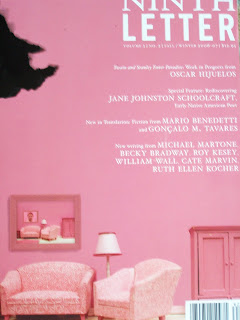Ninth Letter

While at AWP Atlanta, I came across this great-looking journal called Ninth Letter. Unlike most literary journals and reviews with their small trim sizes and flat designs, this journal looks and feels like a real magazine. Printed on a heavy weight, glossy paper, this pink issue could be the second cousin of Real Simple magazine. But don't be fooled. With any luck, Ninth Letter will expand the dimensions of what it means to create an interactive experience between art, literature, and the Internet.
Ninth Letter is a collaborative effort by the University of Illinois at Urbana-Champaign's Department of English and its School of Art and Design. I get the feeling this is a labor of love supported by the school's faculty and students. The Web site is a companion to the journal, not an afterthought, offering a blog, video, past issues, and interactive art projects. I hope the journal will post sample poems and stories but it doesn't look like they do that yet.
Quite frankly, I don't know how they can afford to produce such a beautiful publication. The content is interesting--probably safe to say that Ninth Letter looks for nontraditional art, poetry, and fiction. Seems like they're looking for work that strives to be more than itself. Also, poet and Cave Canem fellow Tyehimba Jess was recently named as a poetry editor.
Check out Ninth Letter's Web site and consider sending in your work. I was so impressed I bought a subscription.
Comments
It is surprising, actually, that there aren't more ventures like this with university-based literary journals (and it seems like this is one way in which they can become distinguished). Anyway, very cool.
best,
Kelli
We had a literary journal at the University of Missouri-Kansas City, where I got my undergraduate degree. It’s called New Letters, and it's really a great publication, but they are very behind the times with technology.
I remember when I was a student, I approached the managing editor of the publication about making an online version of our student journal, for which he served as faculty adviser. He didn't get it. Couldn't understand why anyone would want to read poems online. Most literary journals still fall short with their online presence. They could take a cue from this fine example.